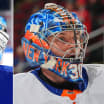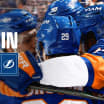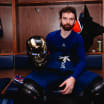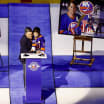Although he arrived in Uniondale almost two decades after the Stanley Cup dynasty, Michael Peca emerged as a significant Islander during one of the club's most bitter playoff series in 2002.
His leadership skills earned him the nickname Captain Crunch. Michael became a Long Islander hero since the "C-Man" played some of his best and most intense games against the Rangers.
Maven's Memories: Schmoozing With Michael Peca
Stan Fischler catches up with Michael Peca on the Isles captaincy and the 2002 playoffs
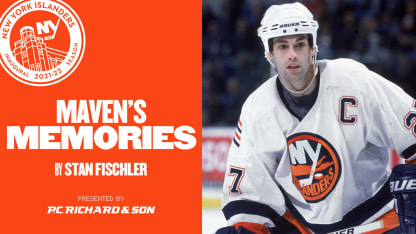
By
Stan Fischler
Special to NHL.com
"Peca was booed lustily in Madison Square Garden," author Zachary Weinstock wrote in his Rangers-Islanders "Rivalry" book. "Rangers fans intensely disliked him because he was so good at what he did."
During one Isles-Blueshirts game, in sequence the Isles captain: 1. bashed Mathew Barnaby; 2. roughed up defenseman Tom Poti and then got Petr Nedved with a not-Good Housekeeping approved forearm-elbow combination.
"It's all part of the way we felt about the Rangers," Peca grinned, "and ourselves."
Obtained in a trade with Buffalo with Isles forwards Tim Connolly and Taylor Pyatt going north, Peca made Isles GM Mike Milbury look good.
Milbury wanted Peca to galvanize a team that previously slogged through the 2000-01 season with a limp record of 21-51-7-3 (W-L-T-OTL).
"I wanted Michael to turn the team around," said Milbury, "and did he ever do that."
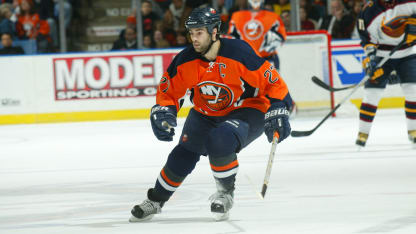
© B Bennett/Getty Images
One of management's first moves was to award Peca the team captaincy. A few years ago, during a visit to a Long Island golf club, Michael sat down with me and explained what the Isles "C" meant to him.
"I knew that the way I played the game," he explained, "that I would lead by example. And by that I mean I'd be working just as hard at practice as I would in a regular game.
"It wasn't a matter of being a 'Rah-Rah" kind of guy. In fact, I used an example of leadership I learned from my grandfather. He might say only three words in an hour, but those three words were a very impactful three words."
With Peca as the club's new inspirational force, the improved Islanders took aim at their first playoff berth in seven years.
Peca: "I had some real good help because Mike (Milbury) also added Alexei Yashin, Adrian Aucoin, Shawn Bates and Chris Osgood to our roster.
"As captain, I found my voice and spoke when I needed to speak. I knew what to say and when to say it. But as it is with any good captain in the National Hockey League, if you're not leading by example, your words are meaningless."
MAVEN'S MEMORIES
WRITTEN COVERAGE
From Doghouse to Penthouse in 1975
Al Arbour's Trifecta
Giving Away the Banks of Gifts -- Almost
Ken Morrow's Moments
First Isles-Rangers Game
Rangers Invade Isles TV Studio
How Chico Resch Became A Goalie
Roland Melanson, Forgotten Hero
Maven's Haven
Another important coaching addition was young Peter Laviolette who, conspicuously, was not hailed by the local media. Laviolette was regarded as too young and too inexperienced to run a major league team.
"The press was dead wrong about that," Peca countered. "I loved Lavvy as a coach. Of course, because he was young, it took Peter time to find his footing in the NHL. He was very intense and he knew how to manage a bench.
"The players loved him and we all could tell that he was going to be very successful. Hey, turning that losing team around the way Pete did was quite a challenge."
Peca had challenges of his own, particularly since he took his captaincy as seriously as Denis Potvin, Pat LaFontaine, Patrick Flatley and Brent Sutter all had before him.
Peca: "My biggest challenge was thinking that I had to solve everybody's problems. I learned that -- when a teammate had a problem -- I was better off taking a guy off to the side and having a conversation; and not being in the guy's face!"
Whatever Peca's formula, it worked. After 14 games, the new, improved Islanders sported a handsome 11-1-1-1 record and became the talk of the league. Newcomers, such as Yashin, became key to the offense.
Meanwhile, the biggest surprise on defense happened to be Peca's best friend on the team, defenseman Adrian Aucoin.
"I knew Adrian from way back in the Vancouver organization," Peca remembered. "Then we came to Syracuse together in The A (American Hockey League.) We were incredibly close.
"But I got along with lots of guys on the team; especially my linemates, Mark Parrish and Shawn Bates. We clicked early on."
Like any team, the Islanders inevitably had issues with certain stickhandlers. One of them happened to be Jason Blake, a peripatetic fourth-liner who believed he should be on either the first, second or third line.
Peca: "Jason was not handling his situation well and that's where my responsibility as captain came into play. I had to sit next to Jason at home and be his roommate on the road.
"I did everything with Jason and I got to understand his mindset. He wasn't happy with the opportunities he was getting and I worked with him on that and it paid off. Blake became a better player and we became the best of friends."
With Peca leading the way, the Islanders gained a playoff berth and faced the Toronto Maple Leafs in the opening round. Those of us who covered the tourney never will forget its intensity.
"That was my favorite of the 21 years I was with the Islanders," recalled former MSG Networks play-by-play man Howie Rose. "That series with Toronto was just a battle -- a blood war.
"The fierceness of it all was incredible. It was an enormous battle. A battle for space, a battle for the puck; a battle in every facet of hockey. It was everything that hockey is and what we love about the sport."
In his oral history of the Islanders, "Unforgettable NY Islanders -- Games & Moments From The Press Box & Front Office," author Matthew Blittner commented, "Both teams deserved to be there but only one could advance to the next round."
Covering the series for Newsday, current MSG Networks sportscaster Alan Hahn recalled Peca's role as the Islanders checking leader.
"Michael was so important to the team," Hahn asserted. "That series was less about the goals being scored and more about the physicality. Which was right up Peca's alley."
The series didn't start well for the Islanders nor Peca. Toronto won the first two games at home but the Isles rebounded to take the next pair at Nassau Veterans' Memorial Coliseum. By now the Island fans were in a frenzy.
Peca: "What I remember best about that series were the fans on Long Island. Those rooters had gone through years of non-playoff misery and then to have the winning season that we had; it was a wonderful change for all of us."
It was for Michael until Game Five in Toronto when Leafs forward Darcy Tucker collided with Peca. To this day, it's a debatable play. In Maple Leaf Land it was not dirty since no penalty was called.
"Tucker got Peca behind the play," said Hahn, "and blew out Michael's ACL."
To those of us broadcasting from the Islanders side, Tucker's hit was one of the most egregious cheap shots in memory and disabled Peca for the remainder of the series.
"What's more," added Howie Rose, "it deprived the Islanders of their leader, best all-round forward and best penalty-killer."
When I reminded Peca of the episode more than a dozen years after it had taken place, I asked -- looking backward -- whether Michael still regarded Tucker's check as a cheap-shot. His answer was both forthcoming and surprising:
Peca: "Yeah, it was a cheap-shot. But cheap shots go on all the time on the ice. I just happened to be on the wrong end of one that ended my season. The strange thing is that Darcy Tucker and I became the best of friends a short time after that.
"Let's face it, over the course of a full season, we put ourselves in a position to get hurt -- and hurt others at times. We don't really intend to do it, but sometimes it happens and it's the nature of the game. In my case, I learned that you've got to live with the good and the bad."
Then, a pause and reflection on that classic series:
"When I reflect on that spring," Michael Peca concluded, "I just wish I could have finished that series. I just wish I had that. But I was thrilled to be an Islander and the excitement of that playoff is something I'll never forget!"




